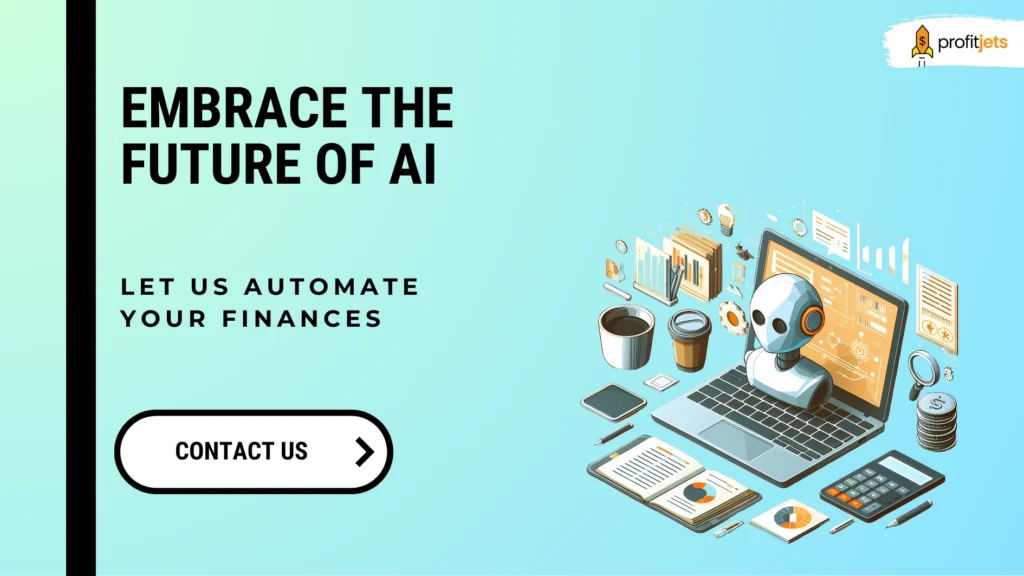AI and automation are transforming bookkeeping and accounting. Bid farewell to manual data entry and say hello to intelligent software that reduces effort, enhances accuracy, and reveals data-driven opportunities. The future is already here.
Table of contents
What is Artificial Intelligence (AI)?
AI refers to machine learning algorithms that can analyze data, identify patterns, adapt, and complete tasks typically requiring human cognition. In accounting and bookkeeping contexts, AI entails leveraging predictive modeling and automation to streamline financial processes.
How do Finance Businesses Benefit from AI?
AI delivers numerous advantages:
- Effortless Efficiency – Automate repetitive manual tasks like data entry and bank reconciliations to improve productivity. Employees can focus on high-value activities.
- Enhanced Accuracy – AI significantly reduces human error by automatically checking for discrepancies across invoices, bank statements, ledgers and more.
- Proactive Fraud Monitoring – Continuously monitor transactions to detect anomalies indicative of fraud attempts or accounting errors rapidly.
- Optimized Taxes – AI streamlines finding deductions, ensures full compliance, and simplifies tax preparation.
- Data–Driven Insights – Uncover trends and growth opportunities hidden within your financial data through predictive analytics.
Leading AI Tools for Bookkeeping and Accounting
Here are some of the leading AI Tools for Bookkeeping and Accounting
Cloud-based accounting platform that integrates bank feeds to automatically import latest transactions. Uses machine learning for bank reconciliation and cash flow analysis. Produces real-time reports and forecasts.
Utilizes natural language processing (NLP) and Optical Character Recognition (OCR) to extract tax-related data from documents. Employs predictive analytics to identify optimal deductions and credits to minimize tax liability. Features step-by-step guided tax preparation.
Ingests data from various sources including bank accounts, credit cards, and eCommerce platforms. Leverages Robotic Process Automation (RPA) for rapid structured and unstructured data entry. Machine learning algorithms reconcile transactions and produce financial statements.
Specializes in accounts payable invoice processing. Uses OCR and NLP to extract key details from unstructured invoice documents and automatically code General Ledger accounts. Integrates with Enterprise Resource Planning (ERP) systems to post approved transactions.
Analyzes historical income, expenses, cash flow, and other trends to forecast future performance. Combines time series analysis, Monte Carlo simulations, and machine learning algorithms to generate financial projections with confidence intervals.
Mobile receipt management app that uses deep learning image classification models to categorize expenses (meals, travel, supplies etc). Extracts receipt details through OCR to auto-populate accounting/bookkeeping systems.

How Can You Automate Bookkeeping and Accounting Using AI?
AI and machine learning enable extensive automation of repetitive, rules-based bookkeeping and accounting tasks, including:
- Transaction Categorization
Automated bank feed analysis and natural language processing classify expenses for efficient recording.
- Invoice Processing
Optical character recognition extracts details from supplier invoices, learns appropriate ledger mappings, and posts approved transactions.
- Reconciliation
Algorithms rapidly match ledger entries with bank statement transactions and detect discrepancies.
- Reporting
Systems generate customized financial statements, calculate relevant metrics, highlight insights, and forecast future performance.
- Compliance
AI tools remain up-to-date on the latest regulatory policies across tax codes, financial standards, and payroll policies to ensure conformity.
- Auditing
Ongoing analysis of 100% of transactions enables real-time fraud detection and retrospective pattern matching to identify anomalies.
Key Benefits of AI in Bookkeeping and Accounting
Primary advantages driving adoption of AI-powered automation include:
- Increased Throughput – Complete higher transaction processing volumes, reconciliations, and reporting cycles faster.
- Cost Savings – Reduce reliance on large, expensive teams for routine manual processes. Enable redistribution of labor to high-value activities.
- Risk Reduction – Minimize human error rates. Continual compliance monitoring and auditing limits fraud and policy violation risks.
- Strategic Insights – Complex predictive modeling reveals trends and growth opportunities hidden within massive datasets.
- Enhanced Customer Service – Greater bandwidth focused on customer analytics allows us to deliver more personalized, timely support.
The convergence of ever-present data, elastic cloud infrastructure, and advances in predictive algorithms enable automation at new scales across the financial domain.
Overcoming Implementation Challenges
Integrating AI tools into existing accounting and finance workflows can pose challenges, including data integration complexities, internal resistance to change, and proper model governance. Strategies to smooth adoption include:
- Assessing integrations – Audit connectivity with current systems early to tackle migration hurdles.
- Staged rollouts – Pilot AI systems for specific processes before wide-scale deployment to build confidence.
- Change management planning – Proactively address personnel reluctance via training and emphasizing efficiencies.
- Governance frameworks – Ensure transparency, regularly validate model accuracy and enforce security protocols.
Sustaining a Competitive Edge with AI
Harnessing AI-driven insights provides an advantage today, but maintaining leadership necessitates continual innovation as disruptive technology progresses.
Recommended initiatives include:
- Frequent capability assessment – Routinely benchmark automation levels against the market to detect innovation gaps.
- Proactive skill building – Invest in developing personnel data science and analytics competencies even without immediate needs.
- Goal-based road-mapping – Define 3-5 year ambition levels for analytics sophistication and plot milestones.
- Exploratory partnerships – Finance and Accounting groups should foster connections with AI research labs and startups to scout emerging techniques.
How Profitjets Streamlines Bookkeeping with AI
Rather than implementing generic solutions, partner with Profitjets, accounting services, for tailored AI-powered financial management. Integrate predictive modeling and automation to:
- Make Data–Driven Decisions – Leverage real-time analytics to capitalize on emerging opportunities.
- Gain Competitive Edge – Accurate books and streamlined processes deliver strategic advantages.
- Focus on Growth – Automate tedious number-crunching so you can nurture customer relationships and innovate.
Ready to Streamline Finances with AI?
Bookkeeping in the 21st century necessitates embracing automation. Profitjets leads this transformation as your AI-powered financial co-pilot, integrating predictive analytics to help your business take flight.
Learn more about our solutions and unlock your financial data’s full potential!







